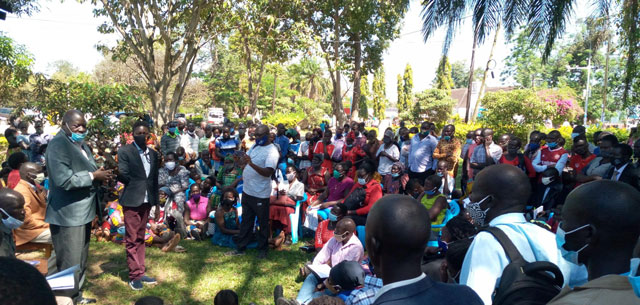
Beneficiaries claim Emyooga funds are hard to obtain due to bureaucracy, corruption and alleged unavailability of the money
Kampala, Uganda | THE INDEPENDENT | Small scale entrepreneurs have decried the corruption involved in the process of accessing government rescue packages especially Emyooga. Emyooga is a presidential initiative on wealth and job creation.
It was launched prior to the outbreak of the COVID-19 pandemic. However, after the COVID-19 outbreak and its effects on the economy, the government decided to expedite the process for disbursing funds to the beneficiaries to support as many people as possible out of the economic crisis.
This was also part of other government rescue programs including a reported Shs 1.1 trillion through Uganda Development Bank meant for small and medium enterprises. The UDB cash is disbursed through the government micro lenders including Postbank and Pride Microfinance.
Hundreds of thousands of people have applied for these funds through the various laid out criteria but reports indicate that it is very hard to get the money due to bureaucracy, corruption and alleged unavailability of the money.
Several small scale entrepreneurs interviewed by URN expressed disappointment at the way the packages are being handled by the responsible government officials which has seen the beneficiaries either fail to get the funds or receive less than they expected.
Agatha Kanyesigye is a micro businesswoman and chairperson of Kireka C Hairdressers Association which comprises 30 members. She explains that they were given Shillings 30 million but were told to first raise Shs 10 million from other sources before withdrawing the cash.
She says to worsen the situation, they had to register their group under a SACCO of another 30 groups, and it is the board of the SACCO that process the cash which she says reduces its value.
Teddy Nalweyiso, another entrepreneur says there are too many types of fees required of the beneficiaries before they finally get the money. She however says that before she got hers, she was asked whether she supported NRM and on answering to the affirmative, her papers were processed.
Regina Nakayenga, the proprietor of Rena Beverages decries the long process and the troubles the beneficiary has to go through including walking several days to the offices to access the money.
She wonders why the government does not use the established structures in the different sectors including the member-associations like Uganda Manufacturers Association of the Small Scale Enterprises and others.
The Chairman of the Uganda Small and Medium Enterprises Association John Kakungulu Walugembe concurs, citing the cash that was sent through the UDB. Some of the entrepreneurs say UDB tells them that the money they got was for the recapitalization of the bank and not for lending out which creates suspicion that it is not there.
Walugembe says it was wrong for UDB to handle money for small enterprises because it does not have an adequate distribution network, the reason it has to disburse it through other lenders. This he says makes the money more expensive.
Hassan Mbaziira, the Manager Monitoring and Evaluation Unit-UWEP at Ministry of Gender, Labour and Social Development told an evaluation workshop for rescue packages in Kampala that the requirements for one to access the money is well laid out and corruption is not tolerated.
He attributes the woes of the business people to lack of information, adding that the red-tape was meant to ensure the money is not mismanaged.
Immaculate Ndagire, the Program Officer, Agriculture Trade for Rural Transformation at SEATINI Uganda says they have been gathering people’s concerns about the rescue funds and they are compiling a paper to submit to the Ministry of Finance, Planning and Economic Development.
She says that for example on the UDB money, the minimum loan amount of Shs 100 million, the high-interest rates and the way the terms are designed are not meant for SMEs.
*****
URN
 The Independent Uganda: You get the Truth we Pay the Price
The Independent Uganda: You get the Truth we Pay the Price



